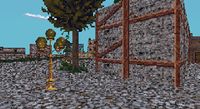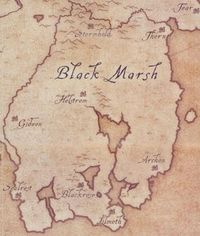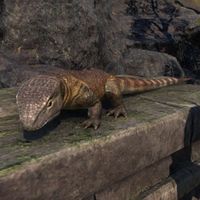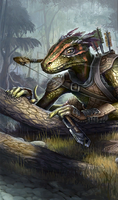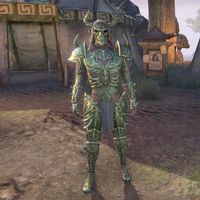Lore:Helstrom
| Helstrom | |
|---|---|
| Type | Settlement |
| Continent | Tamriel |
| Province | Black Marsh |
| Region | Middle Argonia |
| Appears in | Arena |
|
Helstrom is one of the eight major cities in the province of Black Marsh,[1] located in the reputedly inhospitable center of the province called Middle Argonia. Many consider Helstrom the immortal capital of the Argonians.[2] Located in the interior of Black Marsh, which is generally held to be "impenetrable" by non-Argonians,[3] the city itself is notorious for its perilous reputation and the city's guard is reportedly dangerous.[4]
Layout and Geography[edit]
The marsh of Helstrom is very dense and heavily consumed by Heart-Mud, which is reportedly very dark in color.[5] Some creatures in the region have their names attributed to the city, such as the Helstrom Ancestor Lizard, which some scholars speculated to be the progenitors of the Argonian race,[6] as well as the Helstrom Crocodile, an incredibly large variant that went extinct during the Great Burn of 1E 2828 in the Blackwater War. Their skulls were used by the Dead-Water Tribe as a trap for either animals or people.[7] Its alleys are considered both wonderful and dangerous.[8] Helstrom is neighbored by several settlements, including Alten Markmont to the southeast, Greenspring to the southwest, and Tenmar Wall to the north.[1]
Notable Locales[edit]
- Helstrom Palace[4]
History[edit]
Helstrom as a city has been reportedly active since at least the late First Era, concurrent to the Second Empire's invasion of Argonia, known as the Blackwater War.[9] The Battle of Argonia in 1E 2811 was a one-sided conflict between the Imperial Legion and the Argonians, the latter suffering severe casualties. The defending forces retreated to the interior of Black Marsh toward Helstrom, during which the Empire refused to follow nor ever intended to siege. The Empire was content to incorporate the border and coastal regions into its territory rather than the interior.[10] What followed after was the Blackwater War proper, where the Empire eventually managed to take even portions of the interior swamp with the temporary assistance of pirates recruited off the coasts near Lilmoth and Archon.[9] Though the Empire's progress from Gideon in the west eventually ground to a halt outside the core of Black Marsh in 1E 2834, in 1E 2836 the Argonians abruptly stopped fighting with no explanation, and by 1E 2837 the entire region was claimed by the Empire and formally founded as the Imperial Province of Black Marsh.[11]
The city is mentioned in passing in a book called The Alik'r, which was written by the western scribe, Enric Milres in the Second Era.[8] Helstrom became a fully incorporated city-state of the Third Empire and settlements were built deep in the interior by the fourth century of the Third Era. During the Imperial Simulacrum in the late Third Era, the city-state of Helstrom was an active settlement. It was ruled by King Germanus and had a rivalry with Stormhold.[4]
Known Rulers[edit]
Gallery[edit]
Notes[edit]
- Arena was originally conceived as a fighting game featuring a tournament that took the player to each of Tamriel's cities to challenge different gladiatorial teams. According to a file from that stage of development left behind in the final game, Helstrom's gladiatorial team would have been called "the Pit Daemons".[UOL 1]
- The Pit Daemons is one of three factions employed in the gladiatorial guild called the Circle of Champions. They were active all throughout Tamriel in the Second Era, in various major cities and landmarks across the provinces.[12]
See Also[edit]
- For game-specific information, see the Arena article.
References[edit]
- ^ a b Map of Black Marsh – The Elder Scrolls: Arena
- ^ Ritual Circlet antiquity codex entries in ESO: Greymoor
- ^ Pocket Guide to the Empire, 3rd Edition: The War with the Trees: Argonia and the Black Marsh — Imperial Geographical Society, 3E 432
- ^ a b c d Helstrom location and rumors in Arena
- ^ Neelo's Notes — Neelo
- ^ Helstrom Ancestor Lizard pet description in ESO
- ^ Naga Skull Trap antiquity codex entries in ESO: Greymoor
- ^ a b The Alik'r — Enric Milres
- ^ a b The Blackwater War, Volume 1 — Valenca Arvina, Historian-in-Residence at Gwylim University
- ^ Stormhold, City of Shadowfen — Cirantille
- ^ The Blackwater War, Volume 7 — Valenca Arvina, Historian-in-Residence at Gwylim University
- ^ Battlegrounds PvP mode in ESO
Note: The following references are considered to be unofficial sources. They are included to round off this article and may not be authoritative or conclusive.
